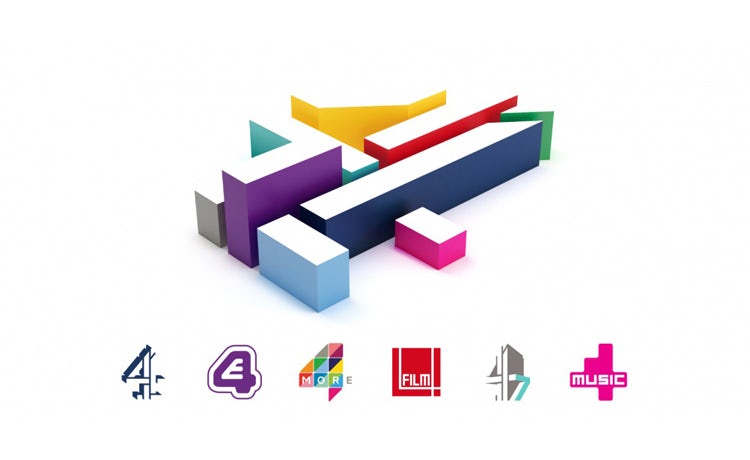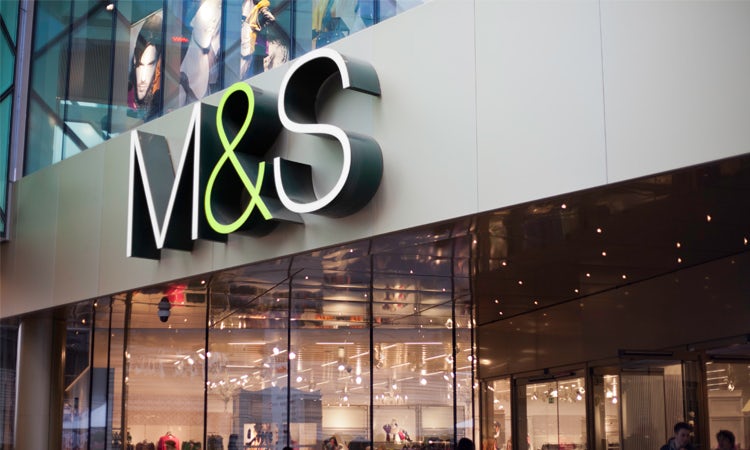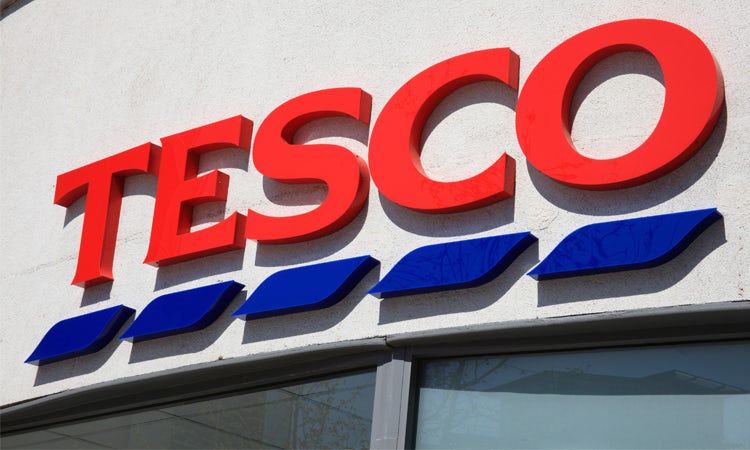Amazon, Starbucks, Papa John’s: Everything that matters this morning
Good morning and welcome to Marketing Week’s round-up of the news that matters in the marketing world today.
Amazon posts record results
Amazon made a record $2.5bn in profit in the second quarter of 2018 – double what analysts had predicted – while revenue grew 39% to $53bn.
The business’s especially strong performance has been attributed to its non-retail divisions – advertising and cloud-computing – which have helped to boost profits by 1,826% year-on-year.
In a conference call this morning, Amazon’s chief financial officer Brian Olsavsky, said business priorities include improving its advertiser tools, automation and measurement.
“We have hundreds of thousands of emerging and established advertisers. And they’re using our services to achieve their marketing goals – whether that’s to drive new brand awareness, discovery or ultimately purchase decisions on our site,” Olsavsky said.
“Our priorities include improving the usability of our tools for advertisers, helping make smarter recommendations for customers. Automating, we’re doing a lot of work on automating the activities that the advertisers need to do, and continue to invent new products for those advertisers.
“We also think measurement is going to be important so we’re focused on our measurement capabilities, so advertisers understand what outcomes they’re driving on our properties. And we think that we’re uniquely positioned to show them the direct benefit of their advertising.
Shares were up by more than 3% in after hours trading.
READ MORE: Amazon.com Announces Second Quarter Sales up 39% to $52.9 Billion
Starbucks has ‘disappointing’ quarter

Starbucks posted $6.23bn in revenue in the third quarter of 2018, while sales grew 11.5% to $6.3bn, up from $5.66bn this time last year.
However, in-store sales rose by just 1% globally, which Starbucks has blamed on a combination of the cannibalisation of its own stores and issues with its China delivery programme. It is expecting full-year same-store sales growth to be “just below” its 3-5% target.
In an earnings call, chief executive Kevin Johnson said: “While acknowledging a disappointing Q3, I want to be clear that we have 100 percent confidence in our growth strategy and the sustainability of the leadership position we have built in the market.”
Starbucks said it added 1.9 million new members to its loyalty programme, up 14% year-on-year to 15.1 million.
Shares were up by less than 1% in after hours trading and are down 10.4% year-on-year.
READ MORE: Starbucks reports cooling quarterly growth and pares outlook
Papa John’s founder sues business

The founder of pizza chain Papa John’s is taking the company to court after he was forced to resign earlier this month for using the N-word during a call.
Lawyers for John Schnatter are arguing that he was treated in an “unexplained and heavy-handed way”, used as a “scapegoat” and that he has been “falsely accused”.
“Rather than address the real issues like the health of the business, the company is hiding documents that, we believe, will disclose the actual facts as to what is occurring here, including Mr Schnatter as a scapegoat to cover up their own shortcomings and failures,” the lawyers said.
Papa John’s said it was “saddened and disappointed” with the lawsuit, which it described as a “needless and wasteful” attempt to distract from his own words and actions.
It is currently working to remove Schnatter’s image from all of its branding.
READ MORE: Papa John’s founder sues pizza chain
Facebook appoints new head of global business marketing

Mark D’Arcy has been appointed vice president of global business marketing at Facebook, in addition to his current role as chief creative officer.
D’Arcy has been at the social network for seven years leading Creative Shop. In his expanded role he will be responsible for managing a global team and will oversee all marketing functions which includes four regional and six centralised functions.
D’Arcy says: “The role is a natural progression of what I love to do – helping businesses tell great stories. It’s an exciting challenge to develop new marketing programs and tools for all businesses – from the world’s most established brands to small businesses and entrepreneurs – that use our platforms to grow.”
David Fischer, vice president of business and marketing partnerships at Facebook, who D’Arcy will report into, adds: “We’re delighted to welcome Mark to this new role. I’ve had the pleasure of watching him transform Facebook’s role in the creative community over the last seven years. He’s a proven leader and talented storyteller who will bring a vital perspective to our business marketing programs.”
Renault launches 100% digital-first campaign

Renault is looking to raise awareness of its new Limited Edition and drive consideration for the brand with a “people-centric” campaign that showcases “everyday heroes inspired by its target audience’s passions”.
It is the car brand’s first campaign to be shot in vertical so it is mobile-first – as well as being adaptable for TV – which Renault says reflects how the automotive consumer journey has evolved to become a mobile digital experience.
It has also been optimised to be shared across social media platforms including Facebook, Instagram and YouTube.
Based on the concept of “designing new limits”, the campaign features a climber, firefighter, dancer and travel blogger.
It has so far been rolled out in Spain, Portugal, Czech Republic, Slovakia, Slovenia and Poland, and will continue to run throughout Europe into 2019.
Thursday, 26 July
Facebook shares tumble 20% as user growth slows
Facebook shares fell by more than 20% yesterday after the social media giant announced its slowest growth in users for over two years.
Wrestling with the aftermath of the Cambridge Analytica data harvesting scandal, Facebook saw its monthly active users grow to 2.23 billion, which despite being a rise of 11% on June 2017 is its slowest growth for more than two years.
Facebook expects its revenue growth to slow as users make the most of new options designed to limit advertising, while less profitable overseas markets drive growth.
Investors were also told that spending growth would outstrip revenue gains in 2019, having an impact on profits. The social media company plans to spend “billions” improving the way it monitors content, tracks advertisers and treats user data. It is also investing in new features around virtual reality and video.
READ MORE: Facebook’s shares tumble as growth disappoints
Diageo credits ‘high performance culture’ for sales rise
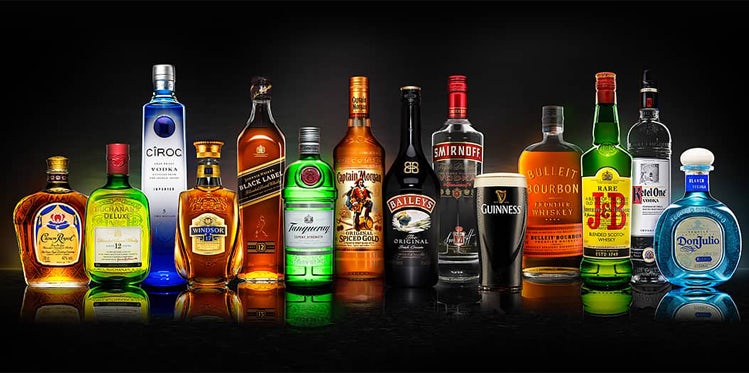
Sales at drinks brand Diaego rose by 0.9% to £12.2bn during the year to 30 June, with operating profit increasing 3.7% to £3.7bn.
Chief executive Ivan Menezes said the results reflect the company’s “high performance culture”, centred on the “ongoing rigorous execution” of its strategy, focus on the consumer and ability to move swiftly to capitalise on trends and insights.
During 2018 Diageo upped its marketing spend to £1.9bn from £1.8bn in 2017. The business increased its marketing spend by 6% in Europe and Turkey alone, as it focused on growth opportunities across the region for Guinness, Johnnie Walker, reserve brands and gin. Diageo reported that productivity initiatives continued to improve the “efficiency and effectiveness” of its marketing investment.
UK net sales rose by 8%, with Tanqueray gin delivering strong double digit growth and Gordon’s benefitting from the launch of its pink gin. Diageo also grew its share of the UK beer category, driven by the strong performance of Guinness Draught and Hop House 13 Lager.
Scotch net sales rose 6% in the UK market, mainly driven by Scotch malts and Johnnie Walker, which was supported by “incremental media activations”. Sales for Smirnoff, however, declined 2%.
North America currently represents 34% of Diageo’s sales, followed by Europe and Turkey at 24%, Asia Pacific at 21%, Africa at 12%, and Latin America and the Caribbean at 9%.
AB InBev global brand revenue surges 10%

AB InBev saw revenue for its three global brands – Budweiser, Stella Artois and Corona – rise by 10.1% globally, and 16.7% outside their home markets, during the second quarter of 2018.
Overall sales rose by 4.7% to $14.18bn, although profits slid to $1.8bn, down from $2.2bn in the same quarter last year.
The company experienced a 0.9% increase in beer volume sales during the second quarter, as sales of premium beers benefitted from the warm weather and packed calendar of sporting events.
The drinks giant described its Budweiser brand as “leading the digital conversation” during the 2018 World Cup in Russia, with a campaign spanning 12,000 pubs and bars, and 26,000 retail outlets.
Budweiser is now the UK’s second biggest beer brand in off-trade, according to the brewing firm, second only to Stella Artois. Limited-edition packaging, partnerships with sporting events like Royal Ascot and Wimbledon, and an emphasis on food pairing in the on-trade environment, helped drive growth for Stella Artois during the second quarter.
Going forward AB InBev plans to maintain its focus on its global brands, low-alcohol and alcohol-free portfolio, as well as its craft business, with its Goose Island and Camden Town brands now reportedly the fastest growing craft beer brand families on trade.
Bud Light was the second largest driver of off-trade value growth for AB InBev during the second quarter, with volumes sold increasing by double-digits.
Nestlé loses KitKat trademark battle
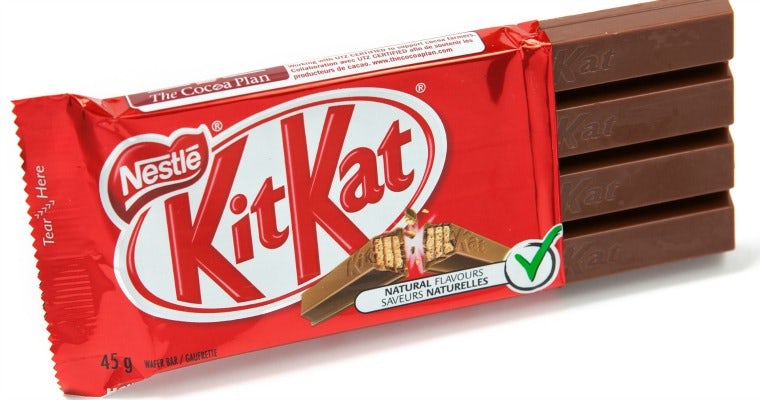
The European Court of Justice (CJEU) has thrown out Nestlé’s attempt to trademark the shape of its four-fingered KitKat.
The confectionery giant was unable to convince the CJEU that the four-fingered shape is instantly recognisable as a KitKat and therefore deserves the right to exclusivity, particularly given that four-fingered Norwegian chocolate bar Kvikk Lunsj, owned by Mondelēz, has been sold in Europe for 80 years.
Nestlé first began its bid to secure trademark protection with the European Intellectual Property Office (EUIPO) in 2002. After four years of debate the EU granted Nestlé a trademark for the shape, a move challenged by rival Mondelēz, which owns Cadbury, Milka, Oreo and Toblerone.
In 2007, the court battle kicked into full forced and raged on until last year when the UK Court of Appeal rejected Nestlé’s attempt to protect KitKat’s shape on the grounds that the shape trademark has “no inherent distinctiveness”.
Earlier this year the Advocate General Opinion (AGO) was given, advising that Nestlé’s appeal should be thrown out and its EU trademark annulled. This final CJEU ruling means that the trademark Nestlé currently holds for KitKat will be revoked.
READ MORE: Kit Kat case: No break for Nestlé in trademark row
Superdrug praises Love Island for 112% sales boost
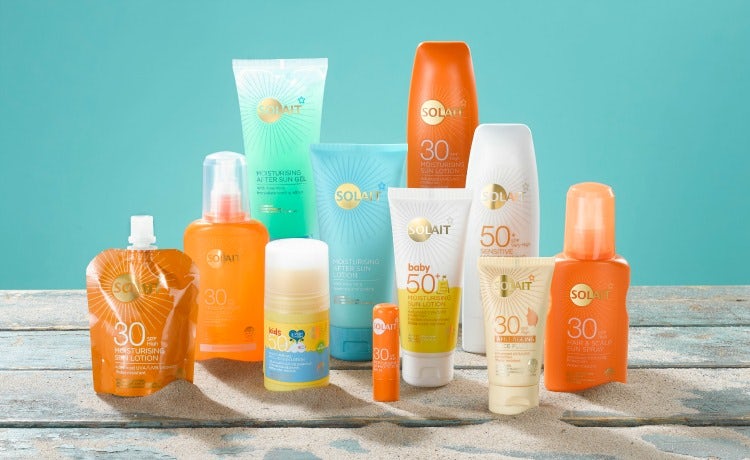
Superdrug says its headline sponsorship of Love Island has driven a 112% rise in suncare sales compared to last year.
The health and beauty retailer, which has been headline sponsor of the ITV 2 show for the past three years, has seen a surge in sales across its Solait suncare range, with the Shimmering After Sun Spray topping its summer bestseller list.
As part of the deal, Superdrug stocks the villa with suncare, fake tan, toiletries and skincare, including its B. Micellar Water makeup remover, sales of which are up 90% on last year. The retailer is also attributing a 43% increase in the number of men undergoing in-store eyebrow threading treatments to the perfectly groomed male brows on show in the villa.
“Love Island is the most talked about show of the summer and we have seen customers rush into store to not only stock up on their suncare essentials, but to also upgrade and modify their beauty regimes as inspired by the Islanders,” adds Simon Comins, Superdrug commercial director.
Wednesday, 25 July
Channel 4 claims young audiences are more receptive to purpose-driven ads
Young people aged between 16-34 are more likely to resonate with important issues through purpose-driven advertising, according to research by Channel 4.
A study conducted by the broadcaster’s sales division, which surveyed an equal number of people in the 16-34 and 35-65 age brackets, found 55% of respondents believe brands should use their power for good, while 45% argue they should only focus on selling products and services.
Young people are particularly receptive to ads containing a wider societal or cultural message, with 60% of 16- to 34-year-olds claiming to notice ads more if they address important issues compared to 55% of 35- to 44-year-olds and just 37% of those aged 45 or older.
Strong ethics is also important, with 56% of those aged 16-34 more likely to associate ethical products with good quality. Most young people also suggest they’re willing to pay more for ethical products – 56% of 16- to 34-year-olds compared to 44% of those aged 35 and over.
A perceived lack of ethics has a negative impact on impressions of a brand, with 41% of young people claiming to have boycotted a brand because they didn’t agree with what it stood for, compared to 33% of those aged 35+.
Head of digital and partnership innovation at Channel 4, Jonathan Lewis, says the research indicates the market for purpose-driven ads is far from saturated.
“People have very clear expectations about what they want from brands operating in this space: they need to be genuine in their messaging, stay relevant to their industries and create resonant ads that cut through,” he adds.
Coca-Cola introduces reverse vending machines to tackle plastic waste

Coca-Cola has joined forces with Merlin Entertainment in a bid to tackle the plastic waste problem and encourage Brits to recycle.
The two companies are offering people half-price entry to some of Britain’s most popular family attractions in exchange for used plastic bottles. The move comes after research revealed people would be more inclined to recycle if they were to be immediately rewarded for their actions.
The scheme will be trialled between 15 July and 19 October across four of Merlin’s attractions – Alton Towers , Thorpe Park, Chessington World of Adventures and Legoland Windsor. People can bring any 500ml plastic bottles and recycle them via a reverse vending machine.
It is understood the trial is the first in the country to offer people a reward worth more than the original purchasing price of the plastic drinks bottle they recycle. The 50% off voucher could save visitors up to £30 when buying a Merlin attraction day pass.
The move comes after Coca-Cola’s recently launched its sustainable packaging strategy.
Coke’s UK general manager Jon Woods says: “We want to reward people for doing the right thing by recycling their bottles and hope to encourage some people who wouldn’t otherwise have done so. All of our bottles can be recycled and we want to get as many of them back as possible so they can be turned into new bottles and not end up as litter.”
The Guardian’s digital revenue overtakes print for the first time

For the first time in history, The Guardian’s parent company Guardian Media Group (GMG) has generated more money from its digital platforms than print sales.
In its annual financial report, GMG revealed it recorded revenue of £217m for the year to 1 April 2018, up 1% from £214.5m in 2017, bolstered by a rise in reader revenues.
Following growth in digital reader revenues and a “competitive” performance in digital advertising, digital now accounts for more than 50% of GMG’s business, with revenue up 15% to £108.6m,
As of June 2018, GMG has a total of 570,000 regular supporters across its print and digital products, and has received an additional 375,000 one-off contributions in the past 12 months. Reader revenues represent more than half of GMG’s total revenues.
Over the course of the last two years, the company’s operating losses were reduced by two-thirds from £57m to £19m with the company on track to achieve its goal of breaking even by April 2019.
David Pemsel, chief executive officer at GMG, says: “In 2016 we set out a three-year strategy based on building deeper reader relationships and getting Guardian News and Media’s finances to break even at operational level, in order to bring the organisation as a whole back to sustainability. The global media sector continues to face challenging conditions, but our strategy is on track to achieve our target and secure the future of The Guardian.”
Facebook to set up office in China despite ban

Facebook is reportedly planning to set up an innovation hub in China, having gained a licence to do so, as it attempts to crack into a market where its website is blocked.
The hub would be designed to support Chinese developers, innovators and startups in what is the world’s largest social market.
The move would mark the first time the social networking giant has had a formal presence in China. Platforms including Twitter, Facebook and YouTube are barred in the country, with Chinese internet users only able to access domestic sites such as Weibo, which can be monitored by the government.
The office has been registered for Hangzhou, in southern China. However, some reports claim the office’s registration has since been removed from the Chinese government website.
READ MORE: Facebook plans office in China
London black cab drivers could sue Uber for £1bn

London’s black cab drivers are edging closer to launching a £1bn class action against Uber, a move that comes after the ride-sharing service won an appeal against its ban in London and was granted a 15-month contract to operate in the city.
A report on Sky claims the Licensed Taxi Drivers’ Association (LTDA) is in talks with top lawyers about a potential legal claim. If the case goes ahead, the LTDA is predicted to argue all 25,000 black cab drivers have suffered a loss of earnings during the last five years at an average of £10,000 each, which would lead to a £1.25bn compensation bill.
London Mayor Sadiq Khan previously argued Uber was not a fit and proper holder of a licence, prompting the ride-sharing service to implement a number of changes such as reporting any driver offences. Khan also highlighted gaps in how Uber screens drivers and conducts police checks.
READ MORE: London cab drivers plot £1bn class action claim against Uber
Tuesday, 24 July
M&S looks to fuel digital transformation by investing in startups
Marks & Spencer (M&S) is hoping to gain direct access to innovative retail tech by partnering with startup incubator Founders Factory. The two firms are launching Founders Factory Retail, a joint venture through which they plan to grow fledgling businesses in the retail sector.
Through the partnership, M&S will invest in new technologies and business models that it hopes to use as part of its digital transformation plan.
M&S CEO Steve Rowe says the partnership will give the retailer access to a “global network of startups and entrepreneurs which will provide disruptive thinking and questioning to the way we work at a time of critical transformation within the business”.
The struggling retailer confirmed it would be shutting more than 100 stores in May as it prepares for a digital-first future, after posting a steep decline in annual profits for the year ending 31 March.
Love Island ads accused of fuelling insecurity as NHS urges ad regulator to do more
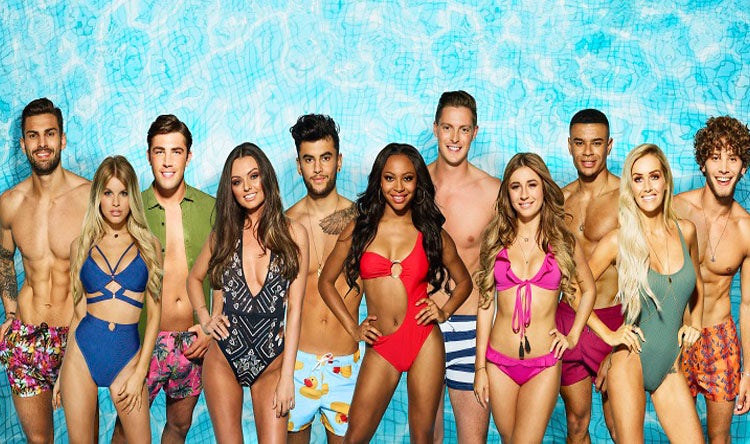
Ads for cosmetic surgery shown during hit ITV show Love Island have been accused of fuelling insecurity among young people. At the same time, mental health officials at NHS England have questioned whether the Advertising Standards Authority (ASA) is doing enough to protect teenagers from these types of messages.
ITV has been urged to stop showing ads for cosmetic surgery after a survey of young people by feminist group Level Up reveals 40% of female viewers aged between 18 and 34 have been left feeling more self conscious about their body as a result.
The study also shows 11% will now consider getting lip fillers and 30% have considered going on a diet to lose weight since watching the series.
Health officials at NHS England are now demanding a sit down with the ASA to discuss concerns that these ads are putting too much pressure on young people, and suggesting broadcast advertisers adhere to a new “duty of care” to protect their mental health.
NHS England’s national mental health director, Claire Murdoch, has written to Guy Parker, CEO of the ASA, urging the regulator to do more to protect children and clamp down on ads that could fuel body insecurity.
Alphabet’s profits tumble after Google fine

Google owner Alphabet saw revenue for the three months to the end of June hit $32.7bn, a 26% rise compared to the same period last year.
However, its profit was impacted by the €4.34bn (£3.9bn) fine it received from the Europeon Union last week, for “illegally” using Android to “cement the dominance of its search engine”. Without the fine, Alphabet’s income for the quarter would have been almost $8.3bn, but was $3.2bn.
Alphabet is appealing the fine decision, with CEO Sundar Pichai saying on a call it was too early to say how the changes requested by regulators will impact its business down the line.
READ MORE: Alphabet surprises as ad sales beat forecasts
Just Eat develops compostable sauce sachets to fight plastic waste
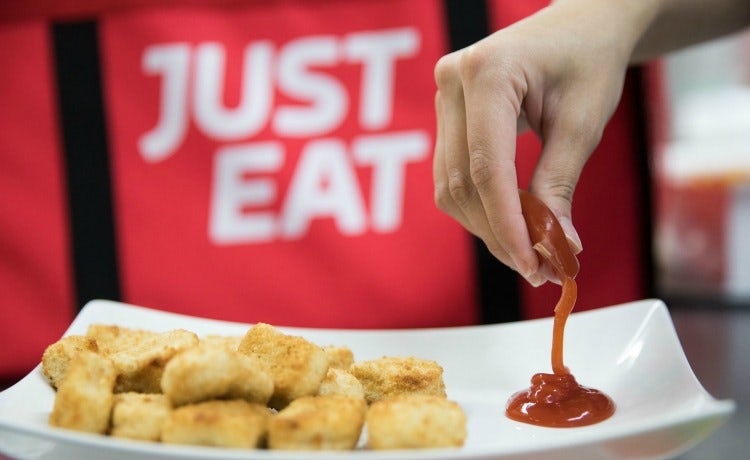
Just Eat is trialling the use of sauce sachets made from seaweed as it looks to reduce the amount of single-use plastic used in the takeaway sector after discovering more than 11 billion plastic condiment sachets are sold globally each year.
The sachets, which have been created in partnership with sustainable packaging development firm Skipping Rocks Lab, are fully compostable and will decompose within six weeks. The seaweed-based sachets, called Ooho!, will be used for ketchup and garlic sauce and be tested over a six-week period.
Graham Corfield, UK managing director of Just Eat, says: “The Ooho! sauce sachets trial and the results from it will form an important part of our ongoing work to develop innovative and credible alternatives to traditional single-use plastic packaging currently in use across the takeaway sector.”
Just Eat outlined a series of measures it will be making to reduce the amount of plastic waste in the sector in March, and is committed to developing “practical alternatives” for single-use plastics.
Just Eat has also been trialling a pre-ticked box on its app and website to encourage customers to opt out of receiving unnecessary plastics, which resulted in 20% of users requesting reduced plastic in their takeaway order.
Snapchat calls time on Snapcash

Snapchat is pulling the plug on Snapcash, the peer-to-peer payment system it launched in partnership with Square in 2014 amid tough competition in the payments market.
Snapcash will stop operating on 30 August, according to TechCrunch, which discovered code alluding to its closure buried in the Snapchat Android app.
Snapchat confirmed the closure to TechCrunch in a statement, saying: “We’re discontinuing the Snapcash feature as of 30 August 2018. Snapcash was our first product created in partnership with another company – Square. We’re thankful for all the Snapchatters who used Snapcash for the last four years and for Square’s partnership.”
Snapcash users will be notified in-app and through the support site soon.
READ MORE: Snapchat will shut down Snapcash, forfeiting to Venmo
Monday, 23 July
Tesco plotting launch of discount store chain to take on Aldi and Lidl
Tesco is reportedly planning to launch a discount chain as the supermarket giant looks to better compete with Aldi and Lidl.
Reports in the Guardian show the retailer is advertising for staff for a new format at a number of locations in the UK, stating that the new retail format “will be operated separately from the core Tesco business”. It has also recently registered the chain ‘Jack’s’ as a retail trademark.
Tesco has seen its lead in the UK market eroded as Aldi and Lidl grow. Tesco’s market share is currently 27.7%, down from 27.9% a year ago, while Aldi and Lidl now command just over 12% of the market between them, according to Kantar Worldpanel.
READ MORE: New Tesco discount chain could launch as early as September
Facebook suspends analytics firms over concerns about data harvesting
Facebook has suspended an analytics firm that harvest data from its site as it looks to avoid a repeat of the Cambridge Analytica scandal.
The social media giant is investigating whether Crimson Hexagon’s contracts with the US government and a Russian non-profit with ties to the Kremlin violate its policies. Crimson Hexagon has contracts to analyse public Facebook posts for clients and claims to have the largest repository of public posts from sites including Twitter and Instagram, as well as Facebook.
However, once it pulls the data from Facebook, the social network has little oversight of what it does with that information, according to sources cited by the Wall Street Journal. Facebook has now suspended Crimson Hexagon’s access and launched an enquiry into how it collects, shares and stores user data.
READ MORE: Facebook Suspends Analytics Firm on Concerns About Sharing of Public User-Data
Quorn invests in R&D as sales rise 12%

Quorn is to invest £7m in a research and development facility as the brand looks to capitalise on the growing number of people adopting vegan diets.
The company saw sales in the first six months of 2018 rise by 12% to £112m, and it is now looking to step up innovation to ensure it stays on top of new trends. While all its products are vegetarian, most are not vegan as they contain egg, but Quorn is developing new products to tap into the increasing popularity of veganism.
The global meat-free category is seeing sales rises of more than 10% every year; in the UK the figure is 15%.
CEO Kevin Brennan tells the Guardian: “All over the world we have seen a real step-change in the way people are eating. Young consumers are really starting to have concerns around meat from a health and sustainability point of view. It’s not that younger consumers are all turning vegan or vegetarian but they are eating substantially less meat.”
READ MORE: Quorn invests £7m into R&D on back of veganism boom
Ryanair profits take a hit amid warnings of summer strikes
Ryanair profits fell by 20% in the first quarter to €319m as higher staffing and fuel costs offset growth in revenue.
Traffic was up by 7% to 37.6 million people, while revenue saw a 9% increase to €2.1bn. However, average fares were down 4% caused by overcapacity in Europe and the earlier timing of Easter.
Ryanair was forced to cancel more than 2,500 flights in the quarter due to air traffic control strikes in France and its own pilots and cabin crew striking. It is also warning about the risks of a no deal Brexit.
WPP in talks to sell Chinese stake to Alibaba or Tencent
WPP is involved in talks with Alibaba and Tencent over plans to sell a minority stake in the ad giant’s Chinese unit. According to Sky News, the firms are in early-stage discussions about buying around 20% of WPP China in a deal that would value the business at up to $2.5bn.
The deal is understood to have been discussed before former CEO Sir Martin Sorrell left, rather than being a response to his departure. Any decision to sell would take several months to conclude.
If it goes ahead, WPP would create a new holding company in China for its Chinese agencies, of which it would retain majority ownership and control. The consortium of Alibaba, Tencent and China Media Capital Holdings would own the rest.
READ MORE: WPP courts Chinese tech giants Alibaba and Tencent over $2.5bn deal

